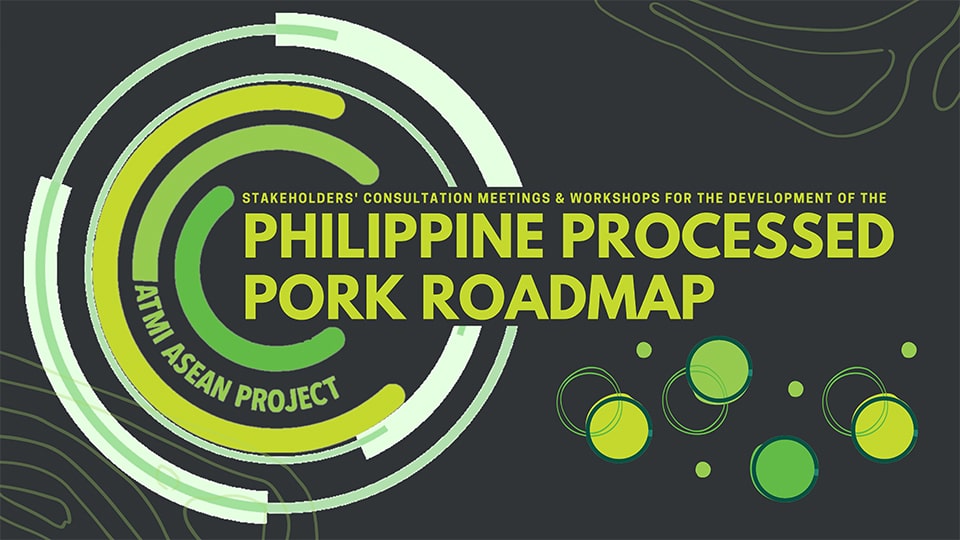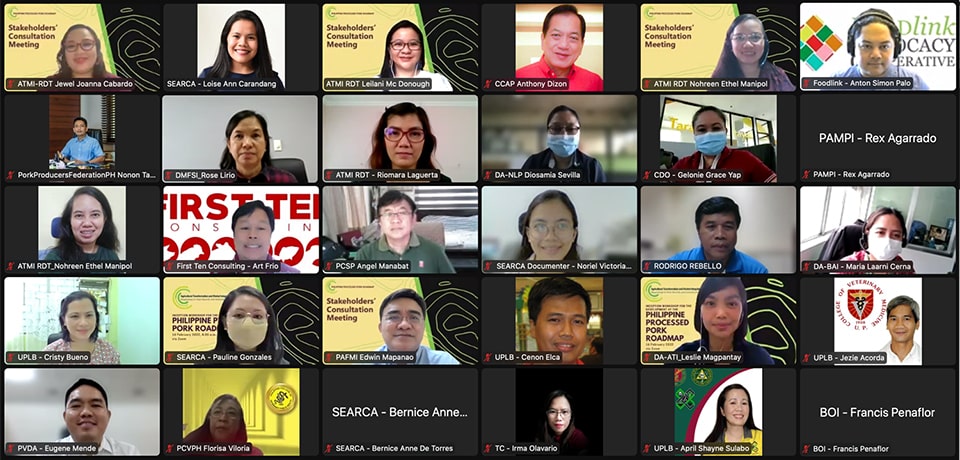
The International Fund for Agricultural Development (IFAD)-funded project Agricultural Transformation and Market Integration in the ASEAN Region: Responding to Food Security and Inclusiveness Concerns (ATMI-ASEAN) gathered stakeholders and key industry players of the processed pork value chain through a series of online consultation workshops and meetings from 23 February until 23 March 2022. The series is part of the Project’s collaboration with the Department of Agriculture (DA) for the development of the Philippine processed pork roadmap. The Philippine Roadmap Development Team (PRDT) under the ATMI-ASEAN Project, with technical support from the Southeast Asian Regional Center for Graduate Study and Research in Agriculture (SEARCA), facilitated these workshops to gather inputs and recommendations from the participants for the development of the national roadmap document.
On February 23, following the Inception Workshop that was conducted in the preceding week, the PRDT and the stakeholders discussed the Industry Situation, Performance, and Outlook which was presented by Ms. Jewel Joanna Cabardo, PRDT Agribusiness Value Chain Expert. This was followed by the mapping exercise in which the PRDT enjoined the stakeholders to specify the roles of their respective organizations in the processed pork value chain. The segments tackled in the VC mapping included input provision, production, live animal assembly & trading, primary processing, fresh meat trading, secondary processing, processed product trading, and final sale. On the same day, Ms. Nohreen Ethel Manipol, PRDT Commodity Expert, presented the initial data on Farm Income and Cost & Return Analysis. This included price increments and the corresponding value adding activities in Luzon for various products ranging from inputs such as feeds to raw and processed pork products.
On March 2, the stakeholders were divided into two (2) breakout groups for the Value Chain Mapping Exercise. Group 1 focused on production, from input provision to fresh meat trading, while Group 2 focused on processing, from secondary processing to final sale. Then, the groups identified the Strengths, Weaknesses, Opportunities, and Threats (SWOT) for each value chain segment. The outputs of these two sessions of the workshop were presented on March 9. Representatives from the following stakeholder-organizations: First Ten Consulting, Foodlink Advocacy Co-operative (FAC), Philippine Association of Meat Processors Inc. (PAMPI), Pork Producers Federation of the Philippines Inc. (ProPork), the Institute of Animal Science of the University of the Philippines Los Baños (UPLB-IAS), and the Board of Investments of the Department of Trade and Industry (DTI-BOI), commented and raised questions on the outputs presented. This was followed by presentations on Benchmarking, Competitiveness Analysis, and Market Trends, Prospects, and Key Demand Drivers by the members of the PRDT.

On March 16 and 23, the PRDT and stakeholders conducted a target setting exercise to identify the Vision, Mission, Goals, Objectives, and Targets of the roadmap. On March 23, Ms. Leilani Mc Donough, PRDT Industry Expert, facilitated the discussion on roadmap strategies and activities, while Ms. Manipol led the discussion on key policies.
The stakeholders that were involved in the series of consultation meetings were representatives from DA regional field offices in Luzon; DA programs, and agencies such as the Agricultural Training Institute (ATI), Bureau of Agricultural Research (BAR), Bureau of Animal Industry (BAI), National Livestock Program (NLP), National Meat Inspection Service (NMIS), and Philippine Carabao Center (PCC); Cooperative Development Authority (CDA); DTI-BOI, and the agency’s Consumer Policy and Advocacy Bureau (DTI-CPAB); Department of Science and Technology (DOST) particularly from the Food and Nutrition Research Institute (FNRI) and Philippine Council for Agriculture, Aquatic, and Natural Resources Research and Development (PCAARRD); Philippine Statistics Authority (PSA); Philippine Tariff Commission; Development Bank of the Philippines (DBP); associations and federations such as PAMPI, ProPork, Cold Chain Association of the Philippines (CCAP), National Federation of Hog Farmers Inc., Philippine Amalgamated Supermarkets Association (PAGASA), Philippine Association of Feed Millers Inc., Philippine Veterinary Drug Association (PVDA), and Philippine Veterinary Medical Association (PVMA); networks of consultants and professionals such as FAC, First Ten Consulting, Philippine College of Swine Practitioners (PCSP), Philippine College of Veterinary Feed Practice (PCVFP), and Philippine College of Veterinary Public Health (PCVPH); the academe from UPLB College of Economics and Management (UPLB-CEM), College of Veterinary Medicine (UPLB-CVM), and IAS and Institute of Food Science and Technology (IFST) under UPLB College of Agriculture and Food Science (UPLB-CAFS); and from private companies such as CDO Foodsphere, Deli Mondo Food Specialties Inc., Purefoods Hormel, and Universal Robina Corporation (URC).
In the last week of March until mid-April, the PRDT, through the assistance of DA-NLP team, led by the Program Director and concurrent Director of DA-ATI International Training Center on Pig Husbandry (ATI-ITCPH), Dr. Ruth Miclat-Sonaco, will conduct field interviews with small-hold producers, processors, viajeros, and cooperatives in the country. The outputs of all the workshops, together with the inputs from these interviews, will be consolidated to comprise the first draft of the Philippine Processed Pork Roadmap. The highlights of the draft document will be presented when the PRDT and stakeholders reconvene on April 20 via Zoom.